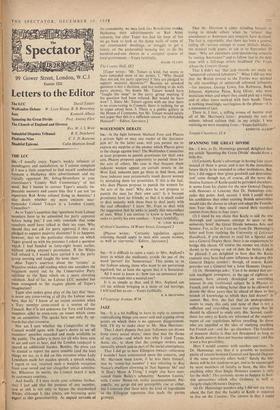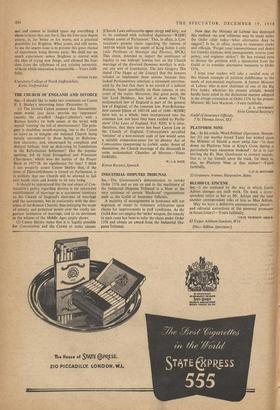SPANNING THE GREAT DIVIDE
was, as Dr. Hemmings guessed, delighted that my article 'Spanning the Great, Divide' should draw a little fire.
.. (1) Certainly Keele's advantage in having four years instead of three is great, and is-not in:the immediate
future likely to be extended to other institutions. But,
first, I did suggest that,'given goodwill and determina- tion' some though not, of course, all the more dis- - tinetive features of Keele could be provided elsewhere. It seems- from his claims for the new General Degree with Honours at Leicester that Dr. Hemmings con- cedes this point. And, second, I Wish I could share his confidence that other existing British universities would take the chance to adopt and adapt the Founda- tion. Year idea if they could extend their standard courses from three to four years.
(2) 1 stand by my 'claim that Keele is still the one thorough and systematic attempt to span 'at the university level' the Great: Divide between Arts and. Science. For, as far as I can see from Dr. Hemmings's - letter and , from studying the University of Leicester Handbook, if you choose to read for a Special and not a General Degree there, there is no requirement tà. bridge this chasm. Of course the sooner my claim is- shown to be wrong or out of date the better I shall be pleased. I am delighted to hear that the Keele example may have had some influence in shaping this 'General Degree venture : though, of course, Keele provides not a General but a Joint Honours Degree.
(3) Dr. Hemmings asks: 'Can it be denied that cer- tain intelligent youngsters, at the age of eighteen or nineteen, have already developed an overriding interest in one traditional subject be it • Physics or French, and ask nothing better than to be allowed to devote the three years that lie, ahead of them Io'th branch of knowledge to which they feel drawn?' It cannot. But, first, the fact that an undergraduate wants to study this, only and none of that is not a sufficient and • overriding reason for saying that he should be allowed to study only this. Second, candi- dates for entry to Keele are informed of the require- ments of our regulations before enrolling. So those who are appalled at the idea of studying anything but French can--and do--go elsewhere. The freedom of innocent choice.is thus not threatened so long as the Keele pattern does not become universal: and this is not alive possibility.
Here I would counter with, another question : 'Is Dr. Hemmings sure that it is possible to maintain parity of esteem between General and Special Degrees if the same university offers both'?' Surely the ten- dency Will be for students to get, and to be encouraged by most members of faculty to have, the idea that anything other than Single. Honours courses is only for the duds'? This certainly seems to happen in Scot- tish universities which offer Ordinary as well as (largely single) Honours Degrees.
(4) Dr. Hemmings wonders why I did not say more about the fact that the faculty at Kccle is required to live on the Campus. The answer is that I could sot and cannot in limited space say everything. I chose to leave that out, for it, like the four-year degree course, is, for better or for worse, not a practical possibility for Brighton. What seems, and still seems, to me the urgent issue is to prevent this great chance of experiment being thrown away. We shall not see much experiment unless Brighton is started with the idea of trying new things, and allowed the free- dom from the syllabuses of any existing university, without which innovation is impossible.—Yours faith- fully, Keele, Staffordshire


























 Previous page
Previous page